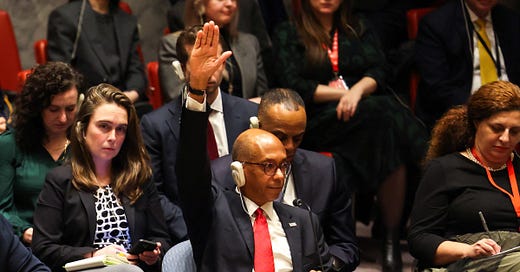The UN's Call: The General Assembly's Vote Evokes Global Emotions
After a UN Security Council vote is vetoed, a non-binding General Assembly vote passes over the Israel-Gaza War. Whether it does anything is harder to tell.
In a pivotal moment at the United Nations General Assembly (UNGA), the international community sent a resounding message with a decisive vote in favour of a non-binding resolution calling for an immediate humanitarian ceasefire in the Gaza Strip.
This vote signifies a significant increase in global support compared to a resolution on Oct 27th, highlighting a growing consensus against Israel's actions.
Furthermore, it sheds light on the Biden administration's isolation on the world stage, especially in its unwavering support for Israel.
A Shift in Global Consensus
The UNGA vote, with 153 member states supporting the resolution, marks a turning point in the diplomatic response to the Gaza conflict.
The substantial increase in support compared reflects a deep concern for the humanitarian conditions in Gaza, where 18,000 Palestinians, predominantly women and children, have reportedly lost their lives, though disputes remain over the validly of the figures, due to them being from the Gaza Health Ministry - a source felt by some observers to be unreliable.
Biden Administration's Isolation
The Biden administration's stance in staunchly supporting Israel since October 7th has left the United States increasingly isolated on the world stage.
The UNGA vote not only highlighted this isolation but also raised questions about the alignment of US foreign policy with broader international opinion.
President Biden's warning to Israeli Prime Minister Benjamin Netanyahu about the risk of losing international support and ‘indiscriminate bombings’ does indicate a potential shift in the US stance, as the administration faces criticism for a perceived double standard in its approach to human rights.
Indeed, such accusations of US/Western hypocrisy that often ring out in the United Nations Security Council (UNSC), will inevitably be magnified to new heights after both this and Friday night’s UNSC vote that the US vetoed.
Challenges in Achieving Consensus
Interestingly, there were failed amendments proposed by the US and Austria aimed at condemning specific actions by Hamas.
These proposed amendments, which ultimately did not receive support, underscore the challenges in achieving consensus on the wording of the resolution. Wording when it comes to resolutions, tends to be some of the most complex and painstaking of the entire process.
Arab countries viewed these amendments as attempts to politicise the vote, emphasising the need to focus on humanitarian efforts and the protection of civilians on both sides.
The complexity of international relations often results in challenges when trying to find common ground on sensitive issues.
Egypt Warns, Israel Rejects
Notably, Egypt (co-sponsoring the resolution on behalf of the 22-member Arab group of nations), issued a stark warning about the potential catastrophic consequences of continuing military action in Gaza.
The Egyptian ambassador to the UN cautioned that the perpetuation of the war could lead to a "full-fledged catastrophe," using genocide as a tool for war.
Indeed, of any state, Egypt faces the most immediate impact, be it from security or humanitarian stances, and consisting underlined, its unwillingness to absorb or host refugees and asylum seekers - putting it at intense odds with Israel.
Such sentiments were echoed by the UN ambassador for Pakistan, who decried the war as a "one-sided slaughter" and placed a significant portion of blame on Israel for the conflagration.
Unsurprisingly, and in sharp contrast, the Israeli UN representative's criticised the resolution for not mentioning Hamas, using"Hamas Nazis" to describe the group.
They even went as far to dismiss and denounce the relevance of the UN as an entire entity, emphasising its existence was essentially pointless.
The UNSC Vote
Keep in mind - all this came after the equally seismic vote in the UNSC which failed due to U.S. veto.
The proposed resolution demanded an immediate humanitarian ceasefire in the Israel-Hamas conflict and already placed the US in a position of isolation as it kept its ally, from a collective call for a cessation of hostilities.
The rare use of a veto in this context emphasised the contentious nature of the resolution with 13 members voting in favour, vs US rejection. Interestingly the UK abstained adding complexity to the diplomatic dynamics.
The proposed amendments by the U.S., including a condemnation of Hamas attacks, rejected by most.
The U.S. preference for its own diplomatic initiatives over UNSC action, with the US favouring pauses in fighting to facilitate the release of hostages and pressing Israel to protect civilians - a case of strategic intervention over conflict resolution.
The UNGS, Antonio Guterres called it a "spiraling nightmare" with the urgency of finding a diplomatic solution. Let alone the failure of securing a ceasefire at the UNSC - bound to ensure global peace and security undermining multilateral diplomacy in resolving protracted and deeply entrenched conflicts.



